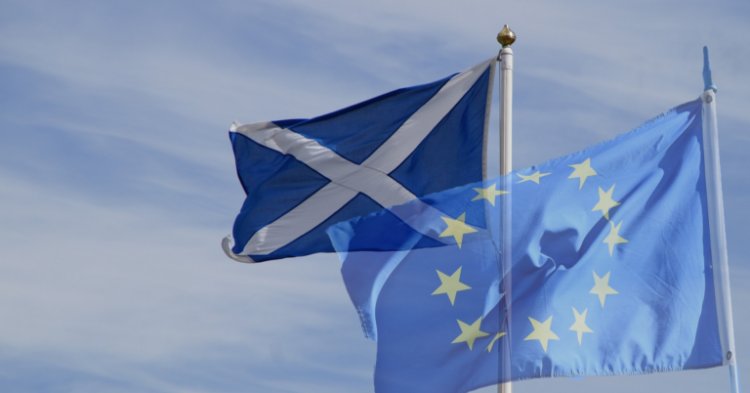From Scottish identity to the desire for independence
“Scotland: old nation, young state” is the title Jacques Leruez gave one of his works. As a researcher at Sciences Po’s Centre for International Research (CERI) specialising in UK governments, he confirmed that “the Scottish are patriots at heart but unionists in practice”. These two quotations highlight just how complex the Scottish situation is. While it has its own culture, Scotland has been tied to England since 1707, the date it lost its independence. It was only after reforms that decentralised the government (led by Tony Blair), as well as the creation of a Scottish parliament at the end of the 20th century that Scotland obtained autonomy over certain areas like agriculture or fishing that are usually entrusted to London.
This political turning point however didn’t prevent a referendum on independence being called in 2014. Although the majority voted against independence, it was the culmination of several years of the SNP fighting for Scottish independence. The SNP saw a rise in popularity in the 60s, when debates had begun over the question of the UK joining the EU. Today, it is one of the major parties in Scotland. In 2007, it won parliamentary elections for the first time and was able to organise an independence referendum seven years later.
Several reasons for independence have been put forward and continue to result in some difficult public debates. They can be summarised in four main points. Reasons involving identity are predominant. Scotland’s culture and history might explain its desire for independence. The dialect is noticeably different, and as previously explained, it has only been tied to the UK since the start of the 18th century. Economic arguments are also brought up, not to mention the oil in the North Sea. Democratic legitimacy and good governance are also arguments that can be heard.
Brexit: a break-up?
The issue of Scottish independence resurfaced after the Brexit result; it wasn’t a short-lived subject, but rather, garnered a lot of attention. Scotland, much like Northern Ireland, declared its opposition to the UK leaving the EU. Indeed, once the UK has left the EU, what future lies ahead for Scotland who voted 62% in favour of remaining? The UK identity has always been separated from the European identity, and Euroscepticism is not a new topic in Great Britain. However, Scotland has been distancing itself from its neighbours for several years now through adopting a largely Europhile policy. One only has to look at this example: all EU citizens to study an undergraduate degree free of charge in Scottish universities.
Yet, many specialists explain the failure of the 2014 referendum as being due to economic fears, but also the Scots’ reluctance to leave the EU. Once Brexit was confirmed, there was no longer any need for this rhetoric. The tables really have turned. The ‘No’ argument, based on fear of leaving the EU if Scotland ever gained independence, suddenly became obsolete.
Explaining the popularity of a ‘nationalist’ party
Today, the main nationalist parties in Europe are opposed to European integration, and even to the European treaties themselves, as seen in France’s National Rally party, or UKIP. However, the logic of regionalist and minority parties is different. In the words of Roccu Garoby: “these stateless nationalist parties” are generally progressive. The SNP, despite having nationalist demands, has distinguished itself by being centre-left and proclaiming its attachment to the EU from the end of the seventies until today. The issue is all the more topical as other minority movements are demanding independence even within the EU, as is the case with Catalonia.
The theme of the EU has become a major component in the strategies of regionalist parties like the SNP, however, for different reasons. A stronger EU and deeper integration may spell the weakening of states’ sovereignty, which would mean a chance for the movement to gain more power. Economic questions have obviously been put forward, as access to the single European market is highlighted by the SNP as an advantage and opportunity for Scotland.
And from the European Union?
The EU has already made a decision about possible independence, whether it be Catalonia or Scotland. The newly independent state would not be automatically considered a member state of the EU. Much on the contrary; it would have to make a membership application to the EU and would have to accept the unanimity of the member states. However, the EU has changed its position regarding the Scottish question since the 2014 referendum. Herman Van Rompuy, ex-president of the European Council, publicly hinted that a membership application from Scotland to rejoin the EU would be seriously considered in the case it ever become an independent State. While the Barroso presidency expressed doubts about the 2014 referendum, the wind in Brussels, nonetheless, seemed to turn in favour of the Scottish government.
It should be noted that the Catalonian shadow is largely used as an argument against Scotland’s accession to the EU as it would be a vehicule for legitimacy. But these two cases differ in two ways. The UK granted a referendum in 2014 to Scotland, which happened with the UK’s agreement, unlike in Catalonia which Spain branded a coup d’état. Spain recently sentenced some separatists to 8-13 years in prison. Enlargement requires unanimity of EU members in the European Council, and Spain could be the most uncooperative. But the Scottish question is not resolved and will depend on the Brexit deal agreed in the future. Scotland’s membership to the EU will be facilitated if a soft Brexit is chosen, which is to say if agreements are reached about the future borders of the UK.
Conclusion
The realisation of a future independent Scotland is looking more and more plausible. In a recent poll, ‘Yes’ could win for the first time and would be a turning point not only for Scotland but also for a future UNunited Kingdom. The EU will also have to deal with an unprecedented situation. Will it follow the saying that has shaped it, namely: “the peoples’ right to self-determination”, or will the Catalonian crisis shatter all hope? The future Brexit agreement and its provisions will be an inexorably determining factor. Brexit is exacerbating tensions between different identities in the United Kingdom. Northern Ireland, Scotland, Wales and England are currently united by the same Kingdom, but only by government institutions.


Follow the comments: |
|
